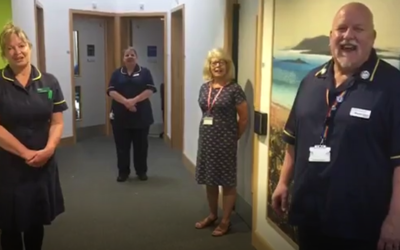Yorkshire transplant patient Gail Hill has been given a new lease of life thanks to a machine that can keep a donated liver alive and healthier for longer.
The new liver perfusion machine, paid for through charity fundraising, offers surgeons at St James’s Hospital, Leeds more options than the current process of keeping a donated organ stored in an icebox. This new technology can potentially allow the team to perform up to 20 more liver transplants a year.
The charity for Leeds hospitals, Leeds Cares, provided the £140,000 needed to purchase the machine, with £30,000 fundraised by patients and staff after an appeal on social media. The liver perfusion machine has four main benefits:
- allows surgeons to better assess the viability of a donated liver before it is used
- reduces the complications and side effects from some types of donated livers
- prolongs the time a donated liver can be preserved before being transplanted
- increases the number of patients who can receive certain types of the organ
The machine works by providing a favourable environment for the liver by using warm oxygenated blood and nutrients to the liver which in addition to allowing the viability and function to be assessed, will reduce many of the complications that are associated with certain types of organs.
Mental health nurse Gail Hill from Barnsley had a liver transplant in December after suffering from polycystic liver disease for 17 years, a condition which caused her to have an enlarged liver and severe abdominal pain. One of her sisters also has this genetic condition.
Doctors were able to hold the donated liver on the new perfusion machine for 14 hours without the organ deteriorating, and then carry out Mrs Hill’s transplant the following morning – something they would previously have been unable to do.
“It has already given me a new lease of life,” said Mrs Hill, a mother of two who was on the transplant waiting list for two years. “Over the past 17 years my condition restricted my quality of life and I stopped being the outgoing, bubbly Gail. I just feel so much better now.
“My liver was very large and it was pressing down on me so much and I was uncomfortable and constantly in pain. I would probably still be on the waiting list without this new machine.”
Consultant Transplant Surgeon, Mr Magdy Attia, said optimizing donated livers and assessing their viability meant they could use more donated organs that might not have previously been suitable for some patients. Increasing the timescale of using the organs, and having them in better condition, also meant procedures could be carried out more safely.
“The most important benefits of the new machine are helping us increase transplants by 15-20 more a year, reducing the number of people dying on the waiting list, and allowing patients to have a safer transplant,” said Mr Attia.
He said the increasing age of liver donors, and the reducing quality of donated organs meant the perfusion machine gave them the opportunity to use more of the donated organs that could not previously have been used. “Thanks to all those who raised the funds we’ve been able to do this,” he said.
Leeds Cares Managing Director Andrew Cratchley said: “We’re incredibly grateful to our donors and supporters for helping us fund equipment like this liver perfusion device. The machine was only ordered in October so the fact that a patient has already undergone a life-saving operation using it is just fantastic.”
For more information on Leeds Cares please visit https://leeds-cares.org/


